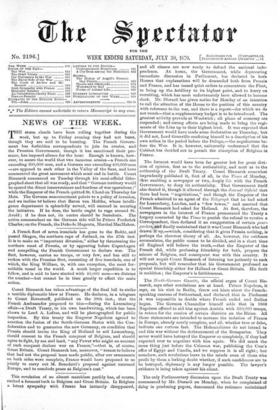The ferment would have been far greater but for great
divi- sion of opinion, first as to the authenticity, and next as to the authorship of the Draft Treaty. Count Bismarck somewhat imprudently published it, first of all, in the Times of Monday, thus enabling a newspaper or two, deeply lies with the French Government, to deny its authenticity. That Government itself also denied it, though it allowed through the Journal Offlciel that there had been " negotiations," and though the Emperor of the French admitted to an agent of the Telegraph that he had asked for Luxemburg, Landau, and a "few towns," and asserted that Count Bismarck had asked for Holland. At first, therefore, the newspapers in the interest of France pronounced the Treaty a forgery concocted by the Times to punish the refusal to receive a Correspondent, then declared it an exaggeration of certain pour- parlers, And finally maintained that it was Count Bismarck who had drawn it up,—which, considering that it gives Prussia nothing, is perhaps the cleverest theory of all. As, however, the evidence accumulates, the public ceases to be divided, and in a short time all England will believe the truth,—that the Emperor of the French did, while professing friendship for both, propose the seizure of Belgium, and consequent war with this country. It will not acquit Count Bismarck of listening too patiently to such proposals, but will remember that his Government professed no special friendship either for Holland or Great Britain. His fault is ambition ; the Emperor's is faithlessness.






























